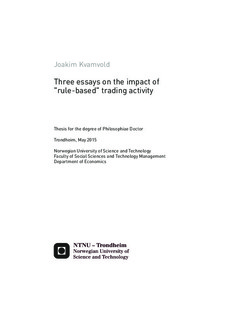Three essays on the impact of “rule based” trading activity
Doctoral thesis

Åpne
Permanent lenke
http://hdl.handle.net/11250/283918Utgivelsesdato
2015Metadata
Vis full innførselSamlinger
Sammendrag
The thesis “Three essays on the impact of “rule-based” trading activity" consists of three papers analyzing the impacts of “rule-based” trading on market prices of stocks. Many large investors (i.e., institutions and mutual funds) often encounter the need to trade stocks as a consequence of predetermined rules set in the managers’ mandate. That many investors pursue the same strategy is referred to as herding behavior in the literature. Such behavior may have implications for market prices of the assets the investors crave. If prices react to changes in demand, following the herd can be very costly for investors.
The impact of reinvestments of dividend payments on stock returns is analyzed in the first paper. Since dividend payments are unrelated to changes in information, the dividend payment process for stocks is ideal when analyzing price impacts. The results in this paper provide new evidence towards a demand driven explanation for changes in stock prices on certain trading days.
Trading caused by net flows to mutual funds invested at the Oslo Stock exchange is examined in the second paper. Reported results favor a demand driven explanation for changes in prices of the portfolio of stocks the mutual funds use as their benchmark.
In the third paper the Norwegian stock market is used as a laboratory to test for possible effects between trading in ETFs and volatility in the underlying portfolio. Weak, if any, evidence is found that trading in ETFs causes return variances on a portfolio of underlying stocks to increase.